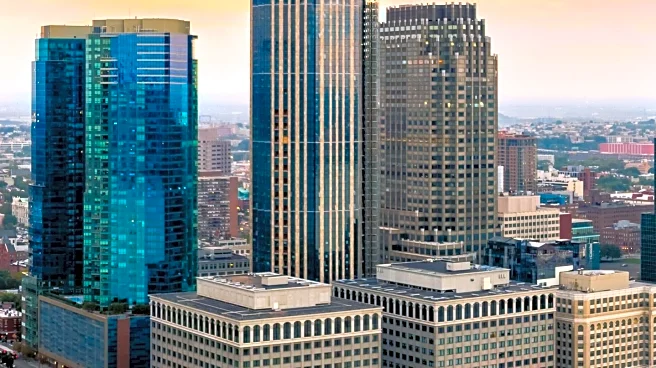What's Happening?
A historic building in Hoboken, once a pudding factory, has been transformed into luxury condos known as Southend Lofts. The development, located at 38 Jackson Street, offers 110 residences with prices
starting at $795,000 for one-bedroom units. The project, developed by the Taurasi Group and designed by Nastasi Architects, preserves the building's industrial character while integrating modern design elements. The condos feature expansive interiors, private outdoor spaces, and a range of amenities including a rooftop terrace, fitness center, and co-working lounge. The development aims to honor the building's legacy while catering to contemporary buyers.
Why It's Important?
The transformation of the former pudding factory into luxury condos represents a significant development in Hoboken's real estate market. It highlights the trend of adaptive reuse, where historic buildings are repurposed to meet modern housing demands. This approach not only preserves architectural heritage but also contributes to urban revitalization. The project offers high-end living options with extensive amenities, appealing to buyers seeking proximity to Manhattan and a vibrant community environment. The development reflects broader trends in urban living, where convenience, luxury, and historical charm are increasingly valued by homebuyers.
What's Next?
With sales underway, Southend Lofts is expected to attract interest from both local and New York City buyers. The development's unique blend of historic charm and modern sophistication positions it as a desirable option in the competitive real estate market. As Hoboken continues to evolve, similar projects may emerge, further enhancing the city's appeal as a residential destination. The success of Southend Lofts could influence future developments, encouraging more adaptive reuse projects that balance preservation with innovation.
Beyond the Headlines
The adaptive reuse of the Hoboken building underscores the importance of sustainable development practices in urban areas. By repurposing existing structures, developers can reduce environmental impact and preserve cultural heritage. This approach aligns with growing consumer interest in sustainability and ethical living. Additionally, the integration of luxury amenities and unique design elements reflects changing preferences in the housing market, where buyers seek personalized and high-quality living experiences.









